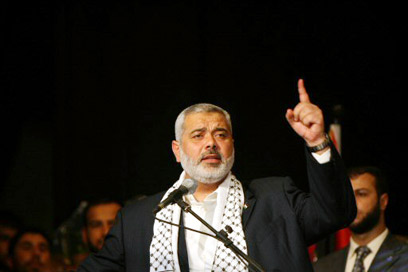
Time for crisis management
Hamas has clear interest in stalling negotiations for Gilad Shalit's release. Israel, traumatized by mistakes made in Ron Arad's case, would do anything to avoid it happening again. Ron Ben-Yishai examines options available
First and foremost, Hamas wants to preserve the fragile ceasefire reached with Israel. It needs the relative calm on order to stabilize its civil authority over the Gaza Strip and regain political clout in the streets. Shalit, in that respect, is Hamas' security bill – a means to ensure Israel stays bound by the ceasefire.
Secondly, Hamas knows the Israeli government is suffering form a collective trauma pertaining to the circumstances in which IAF navigator Ron Arad had vanished, or possibly killed some 22 year ago, during an IDF raid on a Lebanese village where he was being held. The Israeli angst, the determination against any such reoccurrence, is one of the reasons Israel agreed to the ceasefire in the first place – making the negotiations for Shalit's return a prerequisite for the move, but failing to stipulate his release as a prerequisite for upholding it.
Hamas also wanted to wait and see what Hizbullah would be able to get in exchange for its two captives, Eldad Regev and Ehud Goldwasser, in order to see what future leverage it would have. In this case, the waiting paid off: Israel agreed to give Hizbullah living prisoners in exchange, unfortunately, for the soldiers' bodies; a fact which enables Hamas – almost obligates it – to demand a much higher price for Shalit.
And then, of course, there's the "Kuntar precedent": Israel has essentially agreed to set a convicted murder – a terrorist with "blood on his hand" – free.
The third reason for the delay is Hamas' own internal conflict, and one it has with the other militant groups in the Gaza Strip, who share the credit for Shalit's abduction. When the real negotiations begin, Gaza would be sending two delegations to Cairo: A Hamas-Damascus one, headed by senior, radical Hamas official Mahmoud al-Zahar; and a Hamas-Gaza one, headed by moderate Hamas Prime Minister Ismail Haniyeh.
Two other Gaza players, which will be exercising their influence in absentia, are the Popular Resistance Committees (PRC) and the Dormush clan, the self proclaimed "Army of Islam," which were also involved in the kidnapping.

Too many cooks spoil the broth? Hamas Prime Minister Ismail Haniyeh (Photo: AFP)
Opposing interests
Each faction has its own invested interests in the negotiations and each group has its own list of prisoners it wants to be included in any future exchange deal. It took the Gaza factions nearly a year to agree on a joint prisoner list, which still includes only 320 men. Israel essentially agreed to free 450 in return for Shalit, but out of the 320 included in militias' list, it is only willing to release 71.
If Hamas stays adamant about its demands and doesn’t change the compilation of it negotiation team, we may go another four years before we see Shalit, even if Israel would be willing to make substantial concessions.
Israel, however, wants to conclude the negotiations and proceed with the two-stage exchange as soon as possible: Israel will free 350 Palestinian prisoners in exchange for Hamas delivering Gilad Shalit – safe and sound – to Egyptian custody. Once the Egyptians return him to Israel, the latter will release 350 additional prisoners. If we have learned anything from the Ron Arad case, is that the longer these things take, the more likely they are to go wrong. The government has to remember there is a live soldier at stake; and he is being held in an instable area, by unstable individuals.
Another reason to speed things up in the emotional toll Shalit's saga takes on the Israeli people as a whole, not to mention on his family. The ridiculous triangular interaction between the Israeli government, the Regev and Goldwasser families and the media, in the final days before the prisoner exchange deal, maximized the effect of Israel's humiliation by Hizbullah's hand to that of a "mass physiological assault." The anguish and helplessness felt in the public were more detrimental to Israeli national resilience than any of the rockets launch at the country's north during the Second Lebanon War.
No moral justification or self glorification can wipe away the acute blow dealt to Israelis' sense of self respect and security, or the equally destructive blow dealt to our soldiers' sense of safety. That Lebanese cadaver monger was able to get a massive strategic return on his investment, upgrading his status in the Lebanese, Muslim and pan-Arab arenas. The greatest danger in a similar scenario in the Shalit case is another critical blow to our national resilience.
All avenues viable
Given the current situation, Israel can take one of several courses of action:
- It can negotiate for every single name on Hamas' list and assuming Hamas would be willing to elasticize its negotiations, an acceptable solution may be just a few short months away. Unfortunately, the likelihood of such an option materializing is slim – Hizbullah set the bar and Hamas is unlikely to settle for less.
- Another way is for the Israeli government to just agree to the list – give or take a name or two. The general number of parolees has been predetermined; and the list's approval would allow the sides to forge ahead and for Israel to bring Shalit home. The Israeli public may have to endure a few days of media-based humiliation, but Gilad and his family's suffering would end – a fact which would balance out the "physiological assault."
The long term consequences, however, may be devastating: Israel's deterrence would be eroded even further, Hamas would gain immense prestige, increasing its operatives motivation to stage future abductions; not to mention the fact that it would have hundreds of operatives rejoin its Gaza and West Bank operations.

Various means of leverage. Palestinian prisoners' release (Archive photo: AP)
- Israel can pursue a new negotiation avenue, under more pragmatic guidelines; agreeing to release Palestinian prisoner while pressuring Hamas, even at the coast of ending the ceasefire. The only leverage Israel had in its deal with Hizbullah was the government's intent to have Regev and Goldwasser declared killed in action. The leverage Israel has against Hamas consists of much more effective and variousmeasures.
Should this avenue be pursued, Israel would determine different criteria for prisoner release, possibly redefining the archaic term "terrorists with blood on their hand." Ofer Dekel, the Prime Minister's Office emissary heading Israel's efforts on behalf of its missing and captive soldiers, would then be joined by a specialists' committee consisting of IDF, Shin Bet, Mossad and Justice Ministry officials, who would assess the "danger factor" of each Palestinian prisoner, and how imminent that danger is to Israel and its citizens, before deciding on his release.
Should Hamas remain adamant and refuse to make any amendments to the prisoners' list, then Israel would begin applying pressure – reducing the amounts of goods and petrol funneled into Gaza and partially, if not fully, shutting down the border crossings. Egypt, meanwhile, would keep the Rafah crossing closed – with the exception of humanitarian cases.
Hamas, at this point, is likely to renew its rocket fire on the Gaza vicinity communities and the western Negev. Any such action would allow the IDF to relaunch the same surgical strikes which made Hamas ask for the ceasefire in the first place. Once the first round of fire ends, the negotiations are likely to start once more. There is, of course no guarantee that Israel's pressure would result on a deal to free Shalit, but it would probably increase its odds.
Another method of applying pressure on Hamas is for Israel to send letters to each prisoner's family, explaining that the Israeli government is perfectly willing to free their sons if its conditions are met. Hamas may find it hard to rationalize its continuing refusal to change strategy to the prisoners' families.

The longer it takes, the greater the chances of something going wrong. International campaign poster for Shalit's return (Photo courtesy of Jewish Agency)
Stick to your guns
If the Israeli government really wants the negotiations to work, it would have to decide – and stick to – several strategic guidelines, and be prepared to fully see them through.
It would also have to demand that Hamas allow the Red Cross to visit Gilad Shalit and make sure his is alive and well – as well as he can be under the circumstances.
Israel must further demand that all and any negotiations would be covert. Israel must be willing not to divulge any of the negotiation's details, even if Hamas or the Egyptians try to use the Israeli, Arab and international media in order to manipulate the situation. Any leaks spell out undue public pressure on the government, which may result in vital Israeli interests being compromised.
If the Israeli government sticks to it guns and demonstrates grace under the proverbial fire, only then do we stand a good chance of Gilad Shalit coming home sooner, rather than later.
Gilad Shalit has been in Hamas captivity for 755 days.
- Stay Focused










